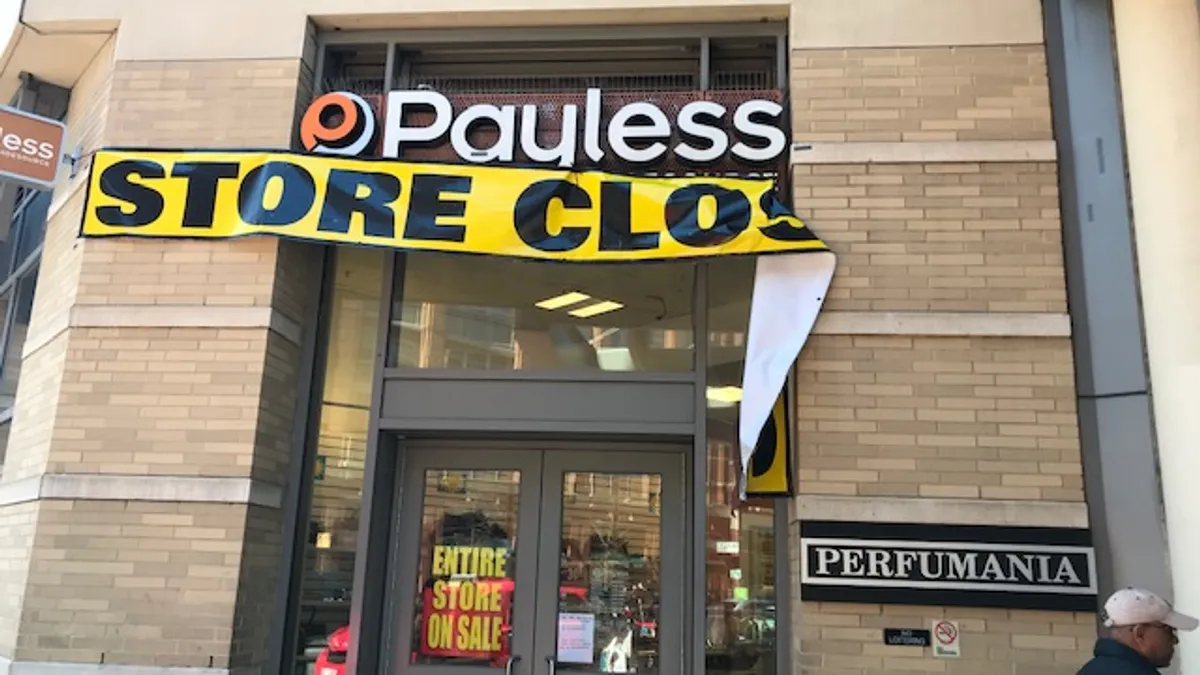Dive Brief:
- Retailers in the U.S. have announced 6,378 store closures so far this year, over 500 more than all of 2018's closures, according to a new report from Coresight Research emailed to Retail Dive. Coresight estimates that as many as 12,000 stores could close by the end of the year.
- Retail bankruptcies this year account for many of the store closings. The liquidation of Payless ShoeSource's entire fleet, including 2,100 stores this year, accounts for about a third of the announced closures as of May. The liquidation of Gymboree, Charlotte Russe and Shopko in bankruptcy add another 749, 500 and 371 stores respectively, according to Coresight data.
- The news isn't all bad, though. Retailers have also announced 2,726 store openings this year. Leading the way is Dollar General, with 975 new store openings announced this year, followed by Dollar Tree (348), Family Dollar (202), grocer Aldi (159), Five Below (136), Ross Stores (100) and beauty retailer Ulta (80).
Dive Insight:
The lists of closing stores this year tell a range of stories, from decades-old retailers that suddenly found themselves irrelevant and financially unviable, and so were forced to wind down in bankruptcy, to those that are carefully reengineering their footprints.
You could put Lowe's in that category, and Party City, which announced plans to close 45 stores in 2019 as an acceleration of its yearly footprint tinkering, but also plans to open new concepts and target new markets.
And then there are the retailers somewhere in between on that spectrum, not in bankruptcy but quickly moving to jettison stores as they face sales declines. That would include the drugstore chain Fred's, which had 159 stores in Coresight's closure count — and on Friday announced plans to shutter more than 100 additional stores — as well as J.C. Penney, Pier 1 and a host of others working quickly to reverse their fortunes.
Not included in Coresight's data set is Bed Bath & Beyond, which has announced plans to close a net of 25 stores this year but did not release details. The home goods box chain has been under pressure from activist investors pushing for better results as it tries to turnaround. Along with the store closures, the retailer has laid off 150 employees, and last week CEO Steven Temares resigned. As the Coresight report, authored by CEO and founder Deborah Weinswig, noted, Temares' departure has been tied to agitation from activists, who are pushing for "improved inventory and a shift in the company culture through training and by implementing innovative technology," Weinswig wrote.
She called out Guitar Center, set to open six stores this year and having just opened a Hawaii store, as a retailer "on a roll" in its turnaround efforts. While still carrying a distressed credit rating, in part due to debt leftover from a leveraged buyout, the instrument retailer has been trying to reinvigorate its business model. "The company has transformed its stores to create a more open concept in which customers can touch and play the instruments, rather than serving as a meeting place for hard rockers, and customers have responded positively," Weinswig wrote.
While discounters and off-price retailers continue peppering the world with their stores, other retailers — many of them over-stored to begin with — are still shrinking as they look for the right balance between physical and digital retail, and shutter unprofitable stores. Newly announced tariffs from the Trump Administration could act as an accelerant, forcing thousands of closures and nixing as much as $40 billion in sales, according to a recent UBS report.















